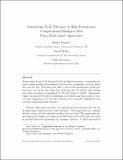Automating fault tolerance in high-performance computational biological jobs using multi-agent approaches
Abstract
Background: Large-scale biological jobs on high-performance computing systems require manual intervention if one or more computing cores on which they execute fail. This places not only a cost on the maintenance of the job, but also a cost on the time taken for reinstating the job and the risk of losing data and execution accomplished by the job before it failed. Approaches which can proactively detect computing core failures and take action to relocate the computing core׳s job onto reliable cores can make a significant step towards automating fault tolerance. Method: This paper describes an experimental investigation into the use of multi-agent approaches for fault tolerance. Two approaches are studied, the first at the job level and the second at the core level. The approaches are investigated for single core failure scenarios that can occur in the execution of parallel reduction algorithms on computer clusters. A third approach is proposed that incorporates multi-agent technology both at the job and core level. Experiments are pursued in the context of genome searching, a popular computational biology application. Result: The key conclusion is that the approaches proposed are feasible for automating fault tolerance in high-performance computing systems with minimal human intervention. In a typical experiment in which the fault tolerance is studied, centralised and decentralised checkpointing approaches on an average add 90% to the actual time for executing the job. On the other hand, in the same experiment the multi-agent approaches add only 10% to the overall execution time.
Citation
Varghese , B , McKee , G & Alexandrov , V 2014 , ' Automating fault tolerance in high-performance computational biological jobs using multi-agent approaches ' , Computers in Biology and Medicine , vol. 48 , pp. 28-41 . https://doi.org/10.1016/j.compbiomed.2014.02.005
Publication
Computers in Biology and Medicine
Status
Peer reviewed
Type
Journal article
Collections
Items in the St Andrews Research Repository are protected by copyright, with all rights reserved, unless otherwise indicated.

